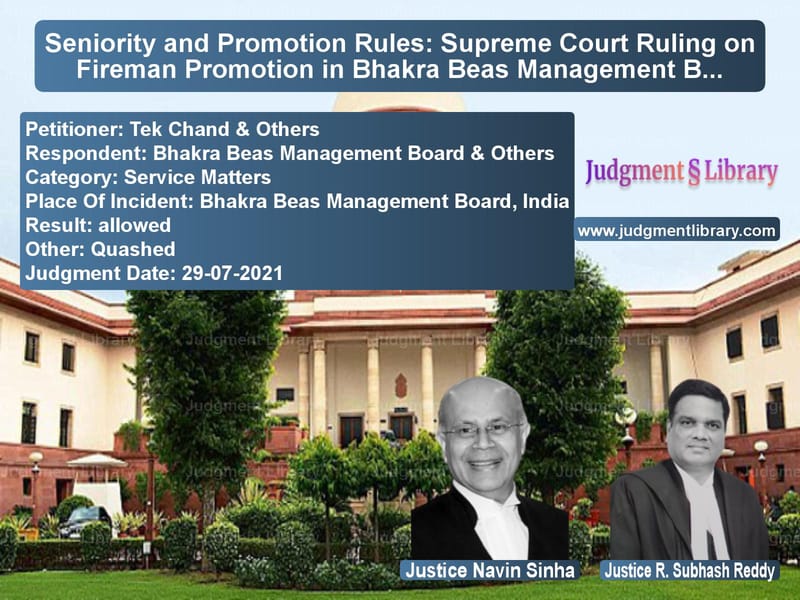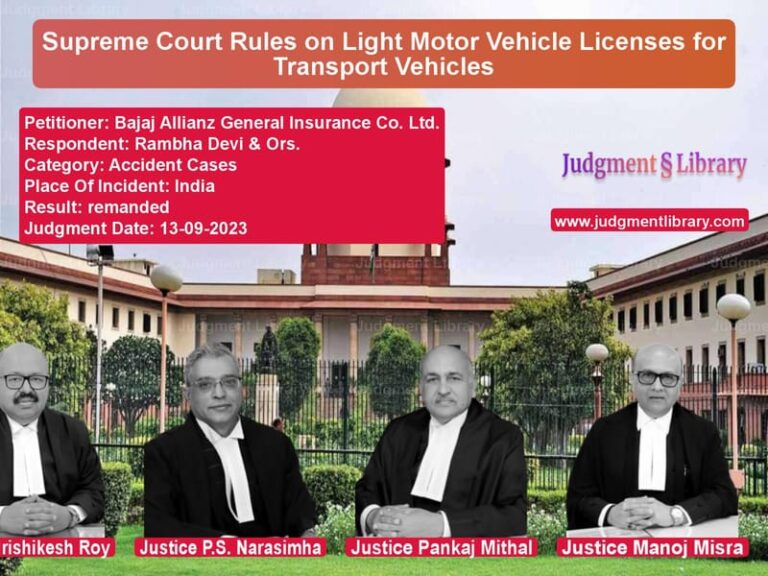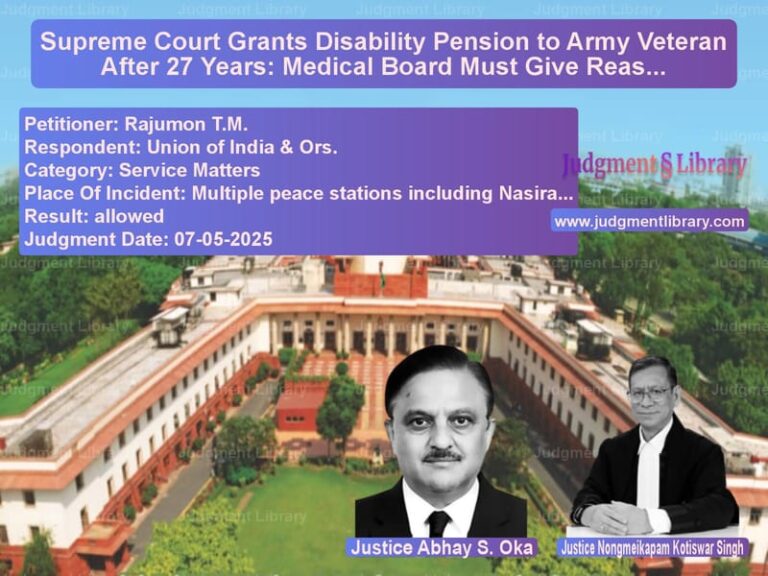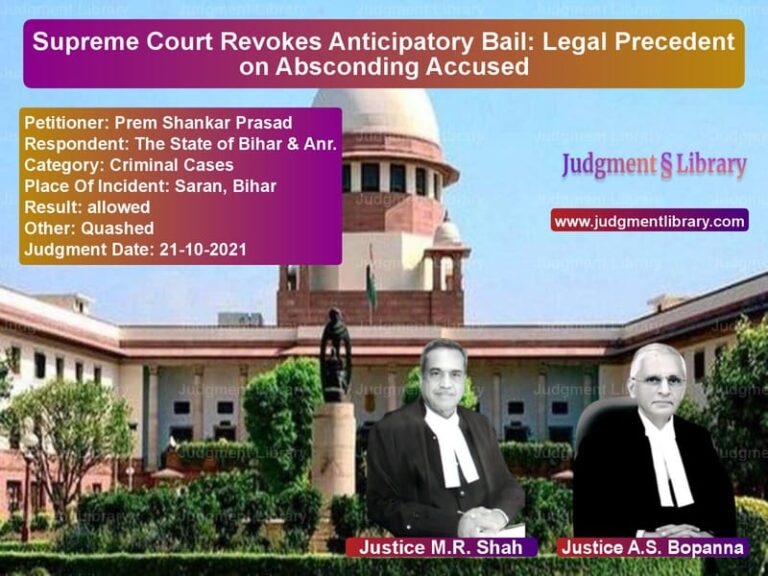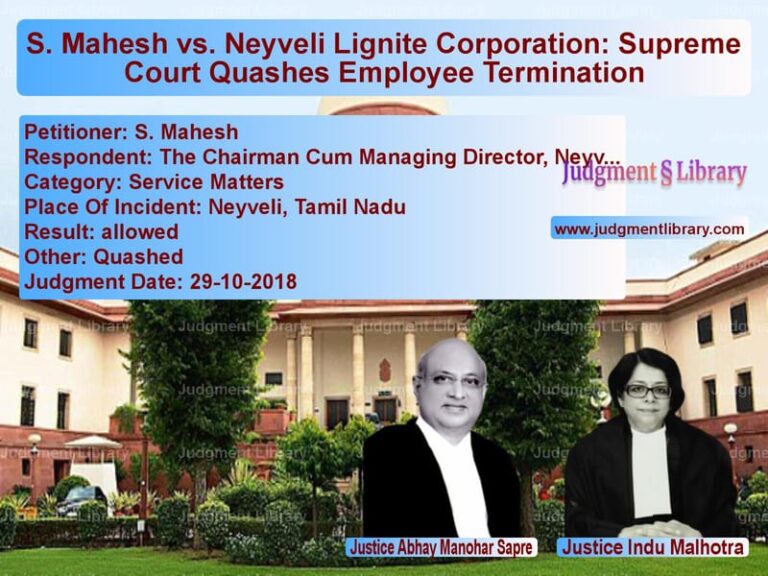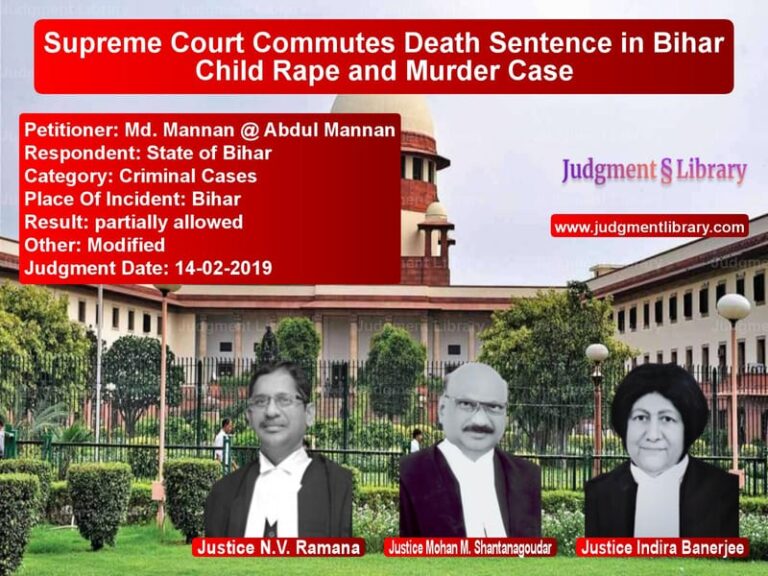Seniority and Promotion Rules: Supreme Court Ruling on Fireman Promotion in Bhakra Beas Management Board
The Supreme Court’s ruling in Tek Chand & Others vs. Bhakra Beas Management Board & Others has provided clarity on the promotion rules under the Bhakra Beas Management Board (BBMB) Class-III and Class-IV Employees Regulations, 1994. The case revolved around the principle of seniority-cum-merit in promotions and whether an appreciation certificate was a mandatory requirement for promotion.
The Supreme Court overturned the Punjab and Haryana High Court’s decision, which had annulled the promotion of the appellants and directed the promotion of the respondent, despite there being several senior candidates in the eligibility list. The judgment emphasized that courts should not travel beyond pleadings or issue directions for out-of-turn promotions without considering the rights of other eligible candidates.
Background of the Case
The dispute arose when the appellants, who were initially appointed as Firemen on February 9, 1991, were promoted to the post of Leading Fireman on February 9, 2012. The respondent, who was appointed as a Fireman on January 9, 1992 (one year later), filed a writ petition seeking consideration for promotion based on available vacancies.
Read also: https://judgmentlibrary.com/seniority-in-government-jobs-supreme-court-ruling-on-ad-hoc-service/
During the pendency of the writ petition, the appellants were promoted, and the respondent was later impleaded as a party. However, the High Court ruled that the appellants were ineligible for promotion and directed the promotion of the respondent instead. The Supreme Court was called upon to decide whether this decision was legally sustainable.
Key Legal Issues
- Was the High Court justified in annulling the appellants’ promotions when they were senior to the respondent?
- Did the High Court have the authority to grant relief beyond the pleadings?
- Was an appreciation certificate a mandatory requirement for promotion?
- How should the principle of seniority-cum-merit be interpreted in this case?
Petitioners’ Arguments
The appellants, represented by their legal counsel, argued:
- Their promotion was in accordance with the seniority-cum-merit principle under Regulation 5 of the BBMB Regulations, 1994.
- They had a good service record and were selected by the Departmental Promotion Committee.
- The High Court exceeded its jurisdiction by annulling their promotions, despite no specific relief being sought against them.
- An appreciation certificate was not an independent requirement for promotion but was merely an additional factor considered under the overall service record.
- The respondent was promoted later in 2014 with effect from 2012, and therefore, there was no injustice against him.
Respondents’ Arguments
The respondent (original petitioner) contended:
- The possession of an appreciation certificate was an independent and mandatory requirement for promotion.
- He alone possessed an appreciation certificate, making him the most meritorious candidate for promotion.
- Since promotion was based on seniority-cum-merit, and he had additional merit, he should have been promoted ahead of the appellants.
Supreme Court’s Observations and Judgment
Seniority-Cum-Merit and Promotion Rules
The Supreme Court analyzed the relevant promotion regulations, particularly:
“Appointment by promotion shall be made by selection based on seniority-cum-merit and no employee shall be entitled to such appointment as of right.”
The Court held that seniority-cum-merit means that senior candidates must be given priority unless they are found unfit for promotion.
Appreciation Certificate Not Mandatory
The Court rejected the argument that an appreciation certificate was an independent mandatory requirement, stating:
“The High Court erred in holding that promotion was not possible without an appreciation certificate. The requirement of ‘good service record’ and ‘appreciable initiative’ are separate factors, but they are not conjunctive.”
High Court Exceeded Its Jurisdiction
The Supreme Court found that the High Court went beyond the pleadings by annulling the promotions of the appellants without any relief being sought against them:
“The respondent’s writ petition only sought consideration for promotion, not the annulment of the appellants’ promotions. The High Court traveled beyond the pleadings, which is impermissible.”
Right to Consideration, Not Right to Promotion
The Court reiterated that promotions must be based on established service rules and principles:
“No employee has an automatic right to promotion. The principle of seniority-cum-merit ensures that senior employees are given due weightage, provided they meet the minimum merit criteria.”
Impact on Direct Recruits and Other Eligible Candidates
The Court noted that the High Court had overlooked the fact that there were 21 other senior candidates in the eligibility list:
“Promoting the respondent ahead of his seniors would be discriminatory and set a bad precedent. A writ petition cannot be used as a means to secure out-of-turn promotions.”
Final Ruling
The Supreme Court allowed the appeal and restored the promotions of the appellants, holding that:
- Seniority-cum-merit must be interpreted in a manner that gives due weightage to senior employees.
- The appreciation certificate was not a mandatory requirement for promotion.
- The High Court’s order was legally unsustainable as it granted relief beyond what was pleaded.
- The respondent’s promotion, which had already taken place in 2014, would not be disturbed.
Key Takeaways
- Seniority matters: In seniority-cum-merit promotions, senior employees have an advantage unless they are found unfit.
- Judicial overreach: Courts should not go beyond pleadings or grant reliefs that were not sought.
- Merit is relevant but not absolute: Merit is a factor in promotions, but it does not automatically override seniority.
- Clear interpretation of service rules: Appreciation certificates, while valuable, are not standalone mandatory requirements for promotions.
Conclusion
The Supreme Court’s ruling in Tek Chand & Others vs. Bhakra Beas Management Board reinforces the importance of seniority-cum-merit in government promotions. It ensures that senior employees are not unfairly superseded and that courts do not exceed their jurisdiction in service matters.
This judgment serves as a crucial reference for employees and employers alike, ensuring fairness and adherence to established promotion guidelines.
Petitioner Name: Tek Chand & Others.Respondent Name: Bhakra Beas Management Board & Others.Judgment By: Justice Navin Sinha, Justice R. Subhash Reddy.Place Of Incident: Bhakra Beas Management Board, India.Judgment Date: 29-07-2021.
Don’t miss out on the full details! Download the complete judgment in PDF format below and gain valuable insights instantly!
Download Judgment: tek-chand-&-others-vs-bhakra-beas-manageme-supreme-court-of-india-judgment-dated-29-07-2021.pdf
Directly Download Judgment: Directly download this Judgment
See all petitions in Employment Disputes
See all petitions in Promotion Cases
See all petitions in Public Sector Employees
See all petitions in Recruitment Policies
See all petitions in Disciplinary Proceedings
See all petitions in Judgment by Navin Sinha
See all petitions in Judgment by R. Subhash Reddy
See all petitions in allowed
See all petitions in Quashed
See all petitions in supreme court of India judgments July 2021
See all petitions in 2021 judgments
See all posts in Service Matters Category
See all allowed petitions in Service Matters Category
See all Dismissed petitions in Service Matters Category
See all partially allowed petitions in Service Matters Category

